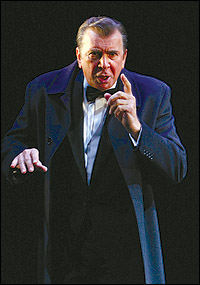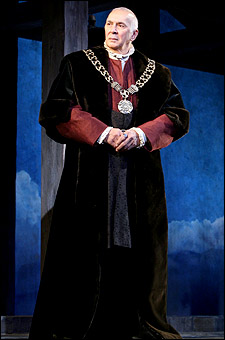
*
Talk about your snappy little changes of pace! It's a wide swing of the pendulum that brings Frank Langella back to Broadway. Coming from his Tony-winning portrayal of Richard Nixon — suddenly realizing (and admitting) the error of his ways — in last year's Frost/Nixon, this season Langella plays Sir Thomas More in A Man for All Seasons, facing the chopping block rather than compromise his conscience when it runs counter to royal command.
The contrast of the disgraced ex-president and Henry VIII's doomed-by-his-ideals lord chancellor was hardly lost on Langella when Roundabout Theatre Company's Todd Haimes and director Doug Hughes pitched reviving Robert Bolt's Tony-winning Best Play of 1962: "I went, 'Oh, what a wonderful next part to play.' It's such the other side of the track."
Great roles gravitate toward Langella and, with his imposing voice and bearing, wear well on him. "I'm attracted to characters who deal with epic issues. I'm really not interested in characters who deal with things on a small scale. They just don't interest me, those men. Nixon, Cyrano, Prospero, Dracula, Shakespeare, Sherlock Holmes, Thomas More — men like that are grappling with huge themes, and I learn from them. I don't mean that in any disingenuous way. I really do. When you get into bed with one of these characters and you must find the very core of why they do what they do, it forces you to look at your own behavior, what you'd do or not do.
 |
||
| Frank Langella in Frost/Nixon |
||
| photo by Joan Marcus |
When Henry VIII opted to divorce Catherine of Aragon for Anne Boleyn, he asked More to argue his case to the Pope. Pleading private conscience, More passed, forcing the king to break with Rome and appoint himself head of the Church in England. Rather than recognize Henry as head of both church and state — as all England had, by oath — More retired, a deafening silence that had to be permanently silenced.
"There are few plays where you get to play true goodness," notes Langella, "to find a way where it's not cloying or sentimental or naïve or, actually, boring. Good, as we all know, can be quite boring. In theatrical terms, it's always better to play villains.
 |
||
| Frank Langella in A Man for All Seasons |
||
| photo by Joan Marcus |
The question of conscience was slow to surface in Frost/Nixon — onstage and, now, on screen. "We started the film 24 hours after we closed on the 19th of August last year. I got on a plane, and I was on a soundstage that Monday afternoon being fitted for a wig and costumes, then two days later into rehearsals. Shooting started with a whole new company — except for Michael [Sheen, his David Frost] — ten days later.
"There were two challenges. The first was to make sure Nixon became cinematic — that it's terribly intimate and still real and still hold on to the qualities I found for him onstage — and the other was stamina, because Ron Howard doesn't think in less than 20 takes — minimum — of anything. Even the simplest moments you do many times, so you had to take your Wheaties. I did the full telephone speech 16 times, from beginning to end, in a row in single takes on the same day. Which I loved, actually."
Rolling Stone critic Peter Travers caught an early preview and called Langella's turn what the theatre world was calling it a year ago: "the performance of a lifetime." The buzz is that Langella will, at long last, land that elusive Oscar to keep his three Tonys company.
 |
||
| Langella in A Man for All Seasons ad |
||
| photo by Platon |










